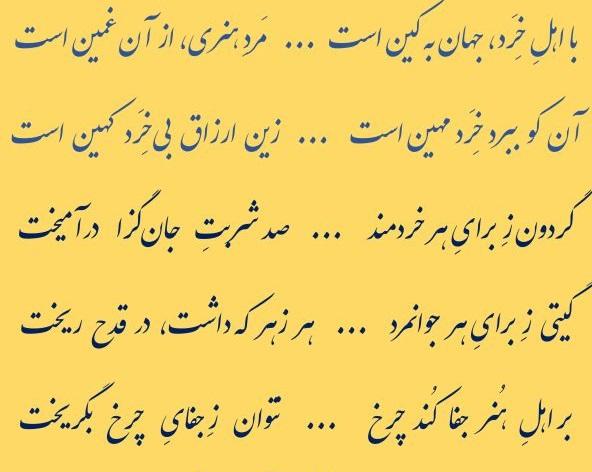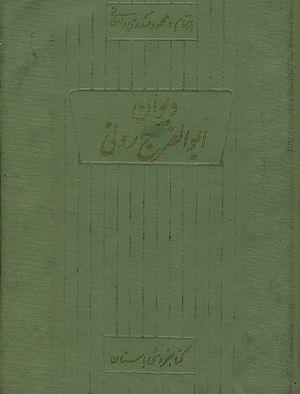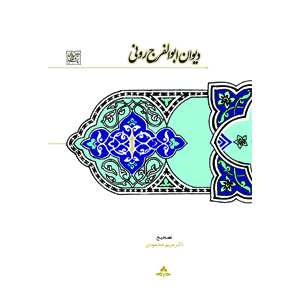Biography of Abol Faraj Roni, a famous poet of the Ghaznavid period

 Abolfaraj Roni
Abolfaraj RoniA summary of the biography of Abol Faraj Roni:
Full name: Abul Faraj Ibn Masoud Roni
Date of birth: –
Place of birth: a group of him from “Rone” from the fields of Khavaran or from the villages of Nishabur and another group of India, “Ron” or “Roin”
is considered the place of birth
Profession: professional poet
Life period: the second period of Ghaznavi
Died: after 492 AH
Abol Faraj Roni's biography:
Abul Faraj Ibn Masoud Roni, who is known as Belfarj, lived in the second Ghaznavid period. There are differences about the origin of Abul Faraj, so some of them believe that Roone is from the fields of Dasht Khavaran or from the Diyeh of Nishabur, and others, especially the philologists in Hendron or Rovinra, consider the name of a town in Lahore to be the birthplace of Abul Faraj.
Aufy gave a biography of him along with the poets of Ghazni and Lahore. The theory that exists is that Abul Faraj was originally from Khorasan, but his place of birth, like Masoud Saad, was Lahore. If it is correct that Abul Faraj is of Khorasani descent, it can be assumed that he was a descendant of Khorasanis and after the Ghaznavid conquests in India, he migrated to Punjab and settled there.
Since there is no exact information available about the date of Abul Faraj's birth, but from the odes he gave in praise of Sultan Ibrahim Ghaznavi, it is clear that he was a famous and famous poet during the time of this sultan.
Because the poems of Abul Faraj were sung by the courtiers in his absence; Authors of tazkira admit that Abul Faraj's fame is after he joined Ibrahim Ghaznavi's dynasty, but what his poems show is that before joining Sultan Ibrahim, he was one of the relatives and admirers of Saif al-Dawlah Mahmud, his eldest son, and it was because of this affiliation that he came to Ibrahim's court. Was introduced; So the relationship between Abul Faraj and Saifullah must have started long before this date.
Saif al-Daulah was officially elected to rule India by his father in 469 AH, and Abul Faraj also mentions this event in an ode while praising Saif al-Daulah.
Prior to this, Abul Faraj met and praised Saif al-Dawlah several times for the campaigns he conducted to get booty from Ghaznin to Lahore and on the way to India. There are 9 odes of this poet in the praise of Saif al-Dawlah.
After the death of Sultan Ibrahim Masoud, he returned to Ghazna from Lahore and introduced his son Shirzad as the ruler of Lahore. Abul Faraj also wrote an ode for this issue, which is included in his Diwan.
Abul Faraj in the description of Ghaznavid sultans, including Abdul Hamid Ahmed bin Muhammad bin Abdul Samad (Sultan Ibrahim's minister), Bunser Parsi (Emir of Shirzad's court), Thagha Malik Tahir bin Ali (Bonser Mashkal's nephew and one of the elders; the king's treasurer), Buhalim Zarir Shibani and his son Mansour bin Saeed Ahmed (Arad Lashkar ) Borshad Rashid (soldier of Sultan Ibrahim) and several other nobles of Lahore and Ghaznin wrote poems.
Abul Faraj Roni had a friendly relationship with Masoud Saad Sultan and wrote a piece in praise of him and his palace, which seems to belong to the youth, the height of power and glory of Masoud Saad in the court of Saif al-Dawlah Mahmud.
Abul Faraj in the Diwan of Masoud Saad:
In Masoud Saad's Diwan, there are pieces that were said in Abu Faraj's address, and one of them was composed in response to the said piece. In two other pieces that seem to have been sent from prison, Masoud Saad complains about his old friend in addition to describing his pitiful situation, suffering and failures during this period, however, he mentions the position of Abu Faraj and himself. His student knows.
 Abol Faraj Roni, a famous Ghaznavid poet
Abol Faraj Roni, a famous Ghaznavid poetA significant point that can be seen in Masoud Saad's poems; It is bad news that one of the prisoners says about Abu Faraj. Some historians consider the addressee of these insults to be Abu Faraj Doni, who had a long-standing enmity with Masoud Saad. It seems that Amin Ahmed Razi said this for the first time and others follow him, because before him, Nizami Prozadi and Awfi did not write anything about the enmity between Abul Faraj Roni and Masoud Saad.
Contemporary scholars have brought many arguments and arguments about the identity of this person, some say that this piece meant Abul Faraj Nasr bin Rast because Abul Faraj Roni at that time, apart from his friendship with Masoud Saad, did not have much power. can lead to the imprisonment of an Amir of the Sultanate.
Despite all these reasons, some commentators do not consider the possibility of Masoud Saad's address to Abul Faraj to be far from the mind and do not reject it.
Other activities of Abu Faraj:
In addition to his poetic works, Abul Faraj also engaged in civil activities, and when he was dismissed from this job due to the oppression and harassment of his enemies; He gave in to poverty and hardship, not to humiliation. This situation continued to the point where he appealed to the elders to find a job and complained about the enmity and grudge that the people of the time had with the artists.
Abol Faraj Roni's poetic style:
Abul Faraj is an ode poet, and after the ode, he deals with stanzas and quatrains more than others, therefore, except for 3 5-verse ghazals, there are no other ghazals of this poet available. The poems of this poet usually start without lyrics or with a short lyric and generally end with a prayer for the eternal survival of Mamdouh.
There is a difference in the number of Abul Faraj's odes. Contrary to the usual, he is small and has a maximum of 20 to 300 verses, and almost half of the existing poems and pieces are with different lines, and sometimes they are long and difficult, and often have short and melodious weights.
Abul Faraj was known as a famous poet both in his time and after that, as mentioned, Masoud Saad is proud of his studentship under Abul Faraj, and in his opinion, the words and meanings of poets have changed because of Abul Faraj's poems, and the dark path of poetry has changed. It is illuminated in the light of his art.
The great poet of the 6th century named Anuri describes his great attachment to the poems of Abu Faraj and calls his poems unique and systematic.
Masoud Saad's reference as well as Anuri's fascination can be seen as the possession of these two poets with a new style and style in Persian poetry. Abul Faraj adopted a new style in which he used Arabic words, terms related to the sciences of interpretation, and Quranic stories more than his predecessors.
He is the first poet who has based similes and metaphors on the basis of a set of knowledge of his time, and for the first time, he forms a scientific institution and background for his poetic images. The strange and complex similes and metaphors that he uses in his poems are sometimes so difficult that the nobles of different knowledge cannot easily reveal the link between the poet's meanings and images.
Among the other characteristics of Abul Faraj's poems, it is possible to mention giving life to mental concepts and psychological qualities such as jealousy, miserliness, and sedition, which distinguish his poems from others. So it can be said that Abul Faraj Runi is the pioneer of a new style that directly and indirectly affects all the poets of the 6th lunar century. His poems and those of his followers have become a basis for changing the style of Khorasani to Iraqi.
 Poems by Abol Faraj Roni
Poems by Abol Faraj RoniDeath of Abolfaraj Roni:
The exact date of the death of Abul Faraj Roni has not been determined, but he certainly lived until 492 AH, because he wrote a poem for Masoud Ibn Ibrahim to sit on the throne. On the other hand, if we accept that Abul Faraj's poem was written on the occasion of the conquest of Qanouj and in praise of Alauddin Masoud, like Masoud Saad and Osman Mokhtari's Fatehnameh of Qanouj, the wind devouring Shahjahan… which happened between 500 and 508 AH, he was alive. Azadani in “Shahed Sadeq” also confirms the correctness of this article.
The works of Abol Faraj Roni:
A Divan of poetry has been left from Abul Faraj Runi, which does not include all of his compositions, because there are verses from Abul Faraj in Labab al-Bab Aufi and al-Mu'jam Shams Qais, which are not found in any of the versions of his Divan.
Abul Faraj Roni's Diwan has been published 3 times so far, one of which is in the margin of Diwan Elementi in India in stone form and twice in Iran in critical form.
The first critical correction to the efforts of Chapkin (the first translator of the Soviet embassy in Iran) and with the notes of Mohammad Ali Naseh was published in the supplement of the sixth year of Armaghan magazine and the second correction was published in Mashhad by Mahmoud Mahdavi Damghani.
There are many copies of Diwan Abul Faraj Roni and his selections.
 Diwan Abul Faraj Roni
Diwan Abul Faraj Ronicompilation: Cover biographical section






